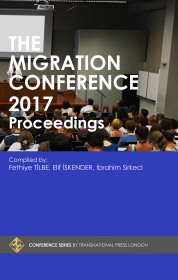Deciding to Stay: Bissau-Guinean Labour Migrants in Cabo Verde, West Africa
Deciding to Stay: Bissau-Guinean Labour Migrants in Cabo Verde, West Africa
Author(s): Kezia Lartey, Brandon D. Lundy
Subject(s): Geography, Regional studies, Labor relations, Migration Studies, Socio-Economic Research
Published by: Transnational Press London
Keywords: Cabo Verde; Guinea-Bissau; buffer countries; choke points; community integration; labour migrants; migration motives; south-south migration;
Summary/Abstract: Cabo Verde, once serving as a migration transit country into Europe and the Unites States, is becoming a final destination for some West African labour migrants, especially those from Cabo Verde’s sister republic, Guinea-Bissau. Many enter Cabo Verde under the Economic Community of West African States’ open borders agreement, eventually overstaying. The aim of this research was to discover why and how Cabo Verde is becoming a choke point for irregular labour migrants from Guinea-Bissau, and the effects these changes are having on immigrant/host community relations. As an illustrative case study on the effects of increased structural barriers to mobility from underdeveloped to developed countries, this study asks, how do marooned Bissau-Guineans integrate into host communities in Cabo Verde, especially when tensions rise alongside migrant populations and resource pressures? What is convincing them to stay? This study is based off of data collected from structured and semi-structured interviews and focus group discussions in twelve communities on two islands. We found that a majority of immigrants had stable, full time work, began families, and joined community organizations. Additionally, what friction was observed stemmed from displaced and disenfranchised domestic youth mainly from the capital city of Praia competing over employment with more highly skilled or experienced migrants. We also found that conflict seems to have lessened with the adoption of the 2012 National Immigration Strategy, the first of its kind in Cabo Verde, although we also argue that more can still be done to improve integration and community relations. This study has implications for realizing successful economic and community integration of irregular labour migrants, especially at choke points in the developing world resulting from structural changes intensifying the role of host in buffer countries within the Global South.
Book: TMC2017 Conference Proceedings
- Page Range: 541-553
- Page Count: 13
- Publication Year: 2017
- Language: English
- Content File-PDF

